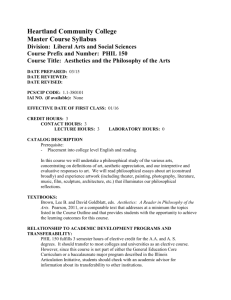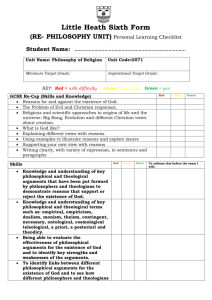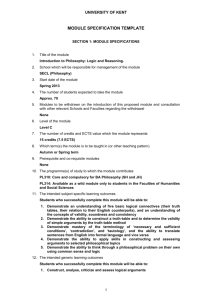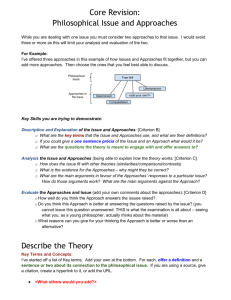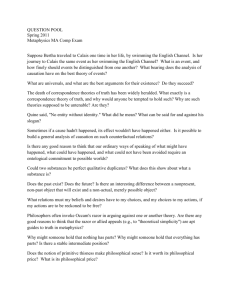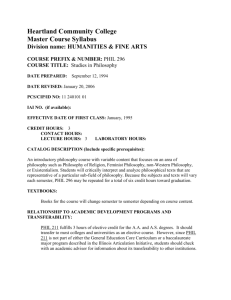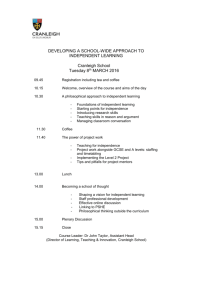How to Write a Philosophy Paper Philosophical writing and thinking
advertisement
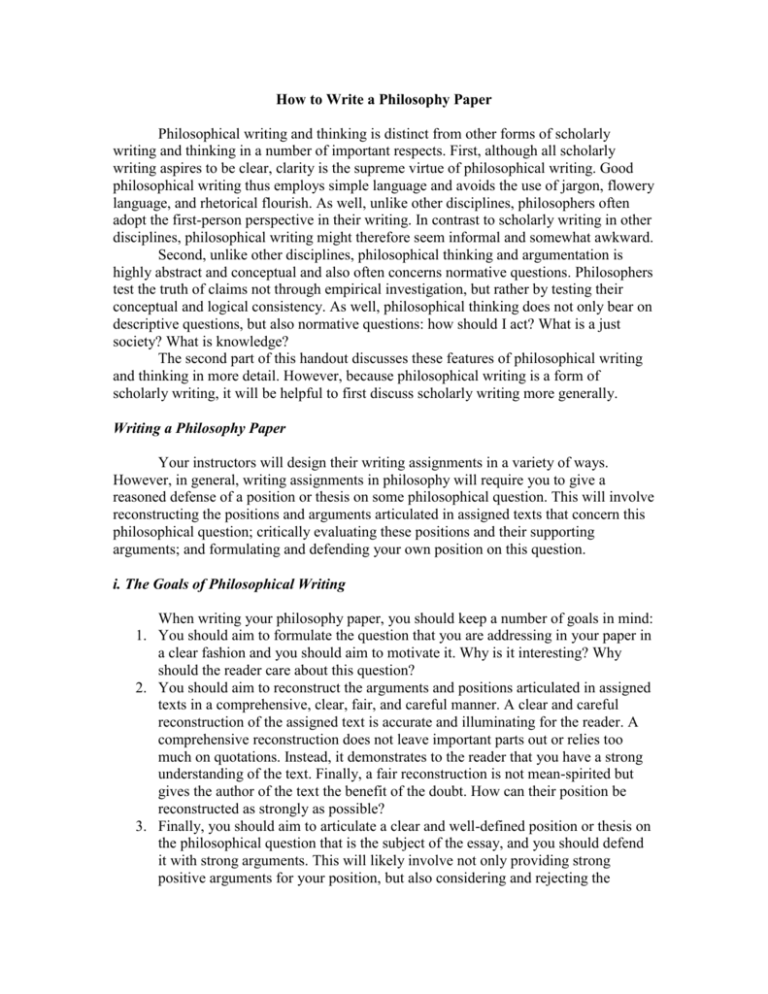
How to Write a Philosophy Paper Philosophical writing and thinking is distinct from other forms of scholarly writing and thinking in a number of important respects. First, although all scholarly writing aspires to be clear, clarity is the supreme virtue of philosophical writing. Good philosophical writing thus employs simple language and avoids the use of jargon, flowery language, and rhetorical flourish. As well, unlike other disciplines, philosophers often adopt the first-person perspective in their writing. In contrast to scholarly writing in other disciplines, philosophical writing might therefore seem informal and somewhat awkward. Second, unlike other disciplines, philosophical thinking and argumentation is highly abstract and conceptual and also often concerns normative questions. Philosophers test the truth of claims not through empirical investigation, but rather by testing their conceptual and logical consistency. As well, philosophical thinking does not only bear on descriptive questions, but also normative questions: how should I act? What is a just society? What is knowledge? The second part of this handout discusses these features of philosophical writing and thinking in more detail. However, because philosophical writing is a form of scholarly writing, it will be helpful to first discuss scholarly writing more generally. Writing a Philosophy Paper Your instructors will design their writing assignments in a variety of ways. However, in general, writing assignments in philosophy will require you to give a reasoned defense of a position or thesis on some philosophical question. This will involve reconstructing the positions and arguments articulated in assigned texts that concern this philosophical question; critically evaluating these positions and their supporting arguments; and formulating and defending your own position on this question. i. The Goals of Philosophical Writing When writing your philosophy paper, you should keep a number of goals in mind: 1. You should aim to formulate the question that you are addressing in your paper in a clear fashion and you should aim to motivate it. Why is it interesting? Why should the reader care about this question? 2. You should aim to reconstruct the arguments and positions articulated in assigned texts in a comprehensive, clear, fair, and careful manner. A clear and careful reconstruction of the assigned text is accurate and illuminating for the reader. A comprehensive reconstruction does not leave important parts out or relies too much on quotations. Instead, it demonstrates to the reader that you have a strong understanding of the text. Finally, a fair reconstruction is not mean-spirited but gives the author of the text the benefit of the doubt. How can their position be reconstructed as strongly as possible? 3. Finally, you should aim to articulate a clear and well-defined position or thesis on the philosophical question that is the subject of the essay, and you should defend it with strong arguments. This will likely involve not only providing strong positive arguments for your position, but also considering and rejecting the arguments of others – both those that you find in the assigned text, but also those that you can think up. ii. The Structure of Philosophical Writing Philosophers generally adopt a standard paper-structure to realize the three abovementioned goals: 1. Introduction 2. Exposition 3. Critical Analysis 4. Conclusion 1. Introduction The introduction is unsurprisingly an introduction to the paper. Here, you need to introduce three things: (i) (ii) (iii) The Question Your Position The Structure of the Paper (i) The Question The first thing you need to do is introduce the question you will address in your philosophy paper. In most undergraduate philosophy classes, the question will be provided by the instructor. You might also want to say a little bit about why the question is important. (ii) Your Position After stating the question, you need to provide a thesis statement. A thesis statement outlines the position on the question that you will defend in your paper. (iii) The Structure of the Paper Having introduced the question you will address, and the position you will take on the question, next let the reader know how your paper is structured – that is, what you do in each part of the paper. In other words, provide a map of your paper. Evaluation: Your introduction will be evaluated in terms of its clarity and conciseness. In the introduction, you want to outline (i) – (iii) as clearly and concisely as possible. Avoid grand statements, such as “Since the beginning of time…” For a 6-8 page double-spaced paper, your introduction should be about ½ to 2/3 of a page. 2. Exposition Whatever the question of the essay is, you will need to reconstruct the positions and arguments articulated in your assigned texts. This might require a discussion of the views that you will take a position on, or it might require a discussion of different attempts to solve the question you are taking a position on. Here, you should aim to make clear the structure of the arguments found in the assigned readings, including premises, conclusions, and assumptions. As well, if it is unclear what the argument is, this is the place to discuss interpretive questions. Evaluation: The explication is evaluated in terms of its comprehensiveness, clarity, accuracy, and organization. The explication should present an accurate, clear, and complete account of the views in question without discussing material that is not relevant. You need to discuss the aspects of the views that are most relevant to the question in an organized manner. Depending on the question, in a 6-8 page paper, the explication should take up about 2 – 4 pages. 3. Critical Analysis This is the crucial part of the paper. Here, you need to present your position on the question and provide arguments for it. This will involve not only providing arguments in favour of your position, but also critical evaluating the positions explicated in your exposition. As well, you should also reply to possible objections that you imagined interlocutor might propose. This is particularly important if one of your arguments seems to invite an immediate and forceful objection from your interlocutor. Evaluation: In terms of your mark, this is the most crucial part of the paper. Philosophy is about critical thinking and this is where you need to do some serious critical thinking. Your arguments will be evaluated in terms of their clarity and strength. Are the reasons you give for your position good ones? Do they invite immediate objections? Do they rely on questionable assumptions. This part of the paper should take up 3-4 pages in a 6-8 page paper. 4. Conclusion The conclusion is just the introduction in reverse. Here, you need to summarize what you have done in your paper. Restate the question, the main points of your explication, and what your argument has been. It is a good idea also to suggest what the implications of your argument are. What issues does it raise that need to be addressed? What consequences does it have for other positions? For more information/resources on writing a philosophy paper, please see: http://philosophy.utoronto.ca/undergraduate/stg/philosophy-resources

